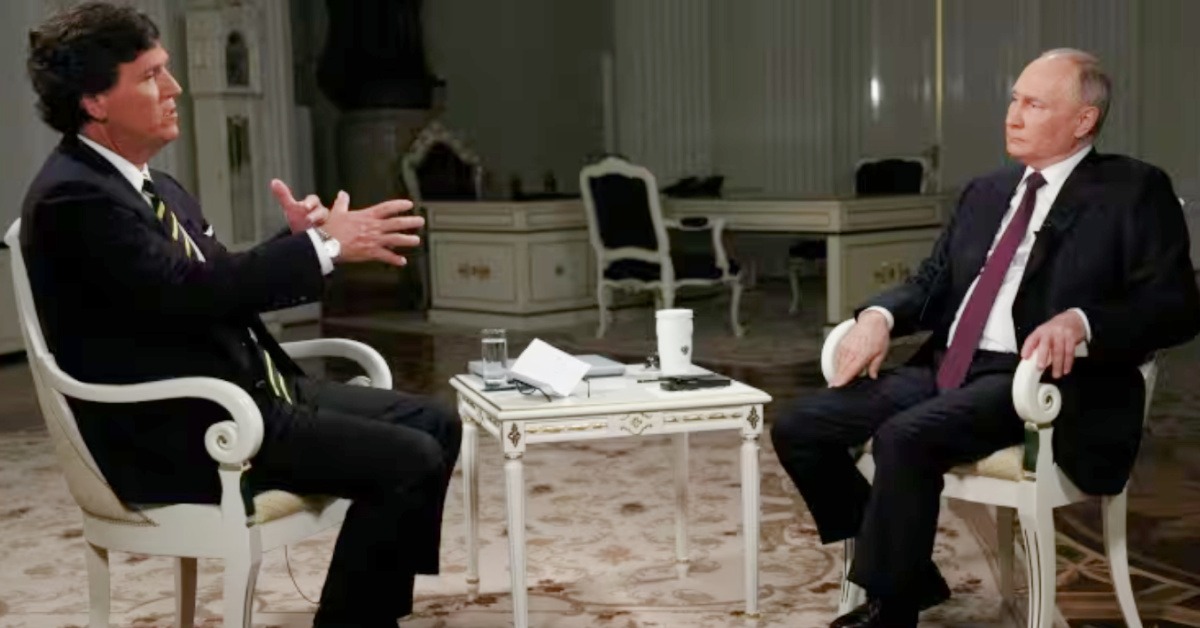A Lot of Folks Didn’t Like Tucker Carlson’s Interview with Putin


[ad_1]
If you”re new here, you may want to subscribe to my RSS feed. Thanks for visiting!
(Psst: The FTC wants me to remind you that this website contains affiliate links. That means if you make a purchase from a link you click on, I might receive a small commission. This does not increase the price you’ll pay for that item nor does it decrease the awesomeness of the item. ~ Daisy)
Is Tucker Carlson a traitor for his interview with Putin? Or is he just a journalist doing journalism?
Tucker aired his two-hour-long interview with Russian President Vladimir Putin on February 8. It received over 200 million views within the first week.
Why would he do an interview with Putin?
Tucker did a short video before the interview explaining his reasons for conducting it. He insists that he is not trying to tell anyone what to think, just exposing people to information not available from mainstream sources.
If Americans are sending huge sums of money to Ukraine, we should understand what’s going on. He also notes that while the war has been a humanitarian disaster for Ukraine, it is also reshaping global alliances in ways Americans just don’t understand. And that has to change.
What did Putin say?
Many Americans have not heard Putin’s side of the story. According to Putin, the current war began in 2014 with the U.S.-backed Maidan coup in Ukraine. Other sources agree. In 2019, Brookings published an article describing the “low intensity but nevertheless real war with Russia”
In 2010, Ukraine elected a Russian-friendly leader, Victor Yanukovych, who was undoubtedly a Russian-backed crook. In 2014, a series of protests began over Yanukovych scuttling a trade deal with the EU at the behest of the Russians, as well as general levels of corruption. Putin insists that the CIA was involved in these protests. While mainstream sources insist that Ukraine’s riots were organic, evidence has since emerged that the CIA was involved.
After these protests, another leader, Petro Poroshenko, was installed. Low-level fighting took place off and on for years. Ethnic Russians living in Ukraine were killed during this fighting, and Putin gives this as his reason for ramping up his “special operation” in 2022.
Putin also brought up his desire to “de-Nazify” the region. Tucker asked him a variety of questions about this, about how a ruler bans opposition parties in other countries. Putin did not have a particularly clear answer.
However, his statements regarding NATO were more straightforward. Putin said that, after the breakup of the USSR, Russian leaders were given assurances that there would be no further eastward expansion of NATO. NATO’s continuous eastward expansion, particularly under President Bush Jr., has alarmed him. Putin brought up multiple instances, under both Bush and Clinton, where he thought he could work with American presidents, only to have those personal agreements later undercut by unelected officials within the federal government.
Tucker asked Putin about his Russian Orthodox faith and how it aligned with his political action in Ukraine because, as Tucker noted, Christianity is supposed to be nonviolent. Putin immediately deflected, saying that Eastern Christianity is far less concerned with one’s actions than Western Christianity and concerns itself with the state of one’s soul.
The last ten minutes or so were spent with Tucker pressing Putin about the release of Evan Gershkovich, the 32-year-old Wall Street Journal reporter who has been imprisoned in Russia for about a year.
The legacy media did not like this interview with Putin.
While many media outlets (CNN, The Independent, Irish Times) referred to it as a “softball interview,” Tucker attempted to redirect Putin multiple times during his initial half-hour-long history lesson, asking him to get to the point. Putin, each time, insisted he was getting there. His questions about Putin’s Christianity and Evan Gershkovich were polite but pointed.
I would never take Putin’s statements at face value. He’s a politician and former KGB. Of course, he’s going to exaggerate some things and omit others. We should all know this. But listening to interviews such as these should encourage us to ask questions and find answers on our own.
Are there really Nazis in Ukraine?
Did American leaders promise not to extend NATO eastward and then do it anyway?
Do average Russians think their life has gotten better or worse under Putin? What about Ukrainians and Zelensky?
Has the US been willing to discuss paths toward peace with Putin, or has Biden continually rejected the notion?
Did Ukraine and Russia come to a tentative agreement in April 2022, only to have Boris Johnson convince the Ukrainians not to back down?
The truth matters. These are all relevant questions.
Americans wanted to see this interview.
Tucker had a fine line to walk.
It’s not that easy to get interviews with heads of state. While Putin has rejected interview requests from mainstream American outlets, he was willing to grant one to Tucker because, as explained by Kremlin spokesperson Dmitry Peskov, “His position is different from the others. It is in no way pro-Russian, it is not pro-Ukrainian, it is pro-American, but at least it contrasts with the position of the traditional Anglo-Saxon media.”
Well, as we’ve discussed here before, Tucker does contrast with the rest of the media.
This interview got 200 million views in less than a week. For some measure of comparison, MSNBC’s most popular news host, Rachel Maddow, typically gets between 2 and 2.5 million views per show. Her interview with Liz Cheney got over 3 million, and that was a big bump. Tucker was the big conservative cable news show host. Rachel remains the biggest liberal one. And Tucker’s interviews sometimes score a hundred times as many views as Rachel’s.
Cutting through propaganda should be a priority.
Tucker’s appeal lies in that he doesn’t talk to his audience as though they’re subjects that need to be handled but like responsible citizens who genuinely want to know what’s going on. He admits when he gets things wrong. He tries to bring people with him on his journey toward truth.
Americans are becoming increasingly aware of propaganda, thanks to alternative media in part but also social media in general. People can gossip with online friends all over the world in ways unimaginable 25 years ago.
I can remember when a phone call to a foreign country cost $4 or $5 a minute. Five years ago, I was part of an online farming chat group moderated by a Canadian that included members from a wide variety of nations. One could pick up news there (like the numbers of elderly Brits freezing to death because of climate policy) found in local papers but that major media outlets wouldn’t touch.
Legacy media is losing control of the narrative, and they know it. At this year’s WEF conference, in the Orwell-inspired “Defending Truth” panel , WSJ’s Editor-in-Chief Emma Tucker admitted as much. “If you go back really not that long ago, as I say, we owned the news. . . . we very much owned the facts as well. . . . Nowadays, people can go to all different sources for the news, and they’re much more questioning about what we’re saying.”
These people believe that the average citizen must subscribe to a given narrative in order for society to function at all. The need for rules and boundaries exists. The Founding Fathers knew this. The U.S. and much of Europe functioned smoothly under Christian values. The Ottoman Empire was stable for hundreds of years under Islamic rule.
Look deeper into the outrage over the interview with Putin.
However, since the end of World War II, people worldwide have been encouraged to ditch religious identities in favor of secular well-being. In place of religious admonitions, we are asked to go along with narratives as presented by government and media figures for the sake of national unity. Think about the rhetoric used against Tucker Carlson. Establishment figures like Bill Kristol and Adam Kinzinger aren’t disputing points with him. They’re calling him a traitor. They speak emotionally rather than rationally.
At the World Government Summit in Dubai, Tucker described how, when he first pursued an interview with Putin several years ago, he realized that national security agencies were monitoring his text messages. He was shocked; he had always believed that, as a law-abiding citizen, he had the right to do his job and tell the truth to the best of his ability. He thought that the agencies were focused on external enemies, not internal dissent.
Control of the narrative consists just as much of omitting relevant information as it does promoting favorable stories. There are so many questions we aren’t supposed to ask. Why are we supposed to care so much about Ukraine’s border but not our own? Why have our extensive sanctions not hurt Russia economically? Why is our beef herd at its lowest level in over seventy years as people who presumably need to eat continue to pour into the country?
Love him or hate him, Tucker is an old-school journalist who sees it as his mission to get people to think about inconvenient truths. The mainstream’s reaction by maligning him says more about them than it does about Tucker.
Former assistant director for counterintelligence at the FBI, Frank Figliuzzi, wrote an article for MSNBC accusing Tucker of being a “useful idiot” in talking to Putin. Failed presidential candidate Hillary Clinton agrees. Though Figliuzzi seethed with contempt for Tucker throughout his article, he admitted that the interview would be useful as it would be analyzed by federal agencies. He also finished on a somewhat threatening note, saying that Tucker’s devices were sure to be continuously monitored after his trip.
Tucker’s not a traitor. He’s just a journalist doing his job. But the response of Figliuzzi and his colleagues reveals a trend within American governance that the Founding Fathers never intended. They wanted the citizenry of this country to consist of informed individuals who took responsibility for the governance of the nation. The desire to surveil dissenting voices, as Figliuzzi so evidently intends, was never supposed to be American.
That kind of behavior is something most of us expect from, well, the Russians.
What do you think about the interview with Putin?
Did you watch the interview with Putin? Did you have any specific takeaways from it? Do you think Tucker was wrong to interview the Russian president? Were there any surprises for you? And what do you think about the collective outrage from the MSM and the Left?
Let’s talk about it in the comments section.
About Marie Hawthorne
A lover of novels and cultivator of superb apple pie recipes, Marie spends her free time writing about the world around her.
[ad_2]
Source link
Recent Posts
Dear Diary, It’s Me, Jessica: Part 16
[ad_1] If you're new here, you may want to subscribe to my RSS feed. Thanks…
Google Faces Lawsuit After $5M in Crypto Stolen via Play Store App
[ad_1] A Florida woman, Maria Vaca, has sued Google in a California state court, alleging…
All About Water Purification: A Complete Tutorial
[ad_1] You may need to purify water to make it safe to drink. The process…
Protocol Village: Quai Releases Mainnet-Compatible Devnet, Crunch Lab Raises $3.5M
[ad_1] The latest in blockchain tech upgrades, funding announcements and deals. For the period of…
The Grim New Daily Life in Venezuela
[ad_1] If you're new here, you may want to subscribe to my RSS feed. Thanks…
World’s 3rd largest public pension fund buys $34M MicroStrategy shares
[ad_1] The third-largest public pension fund in the world has just bought nearly $34 million…
